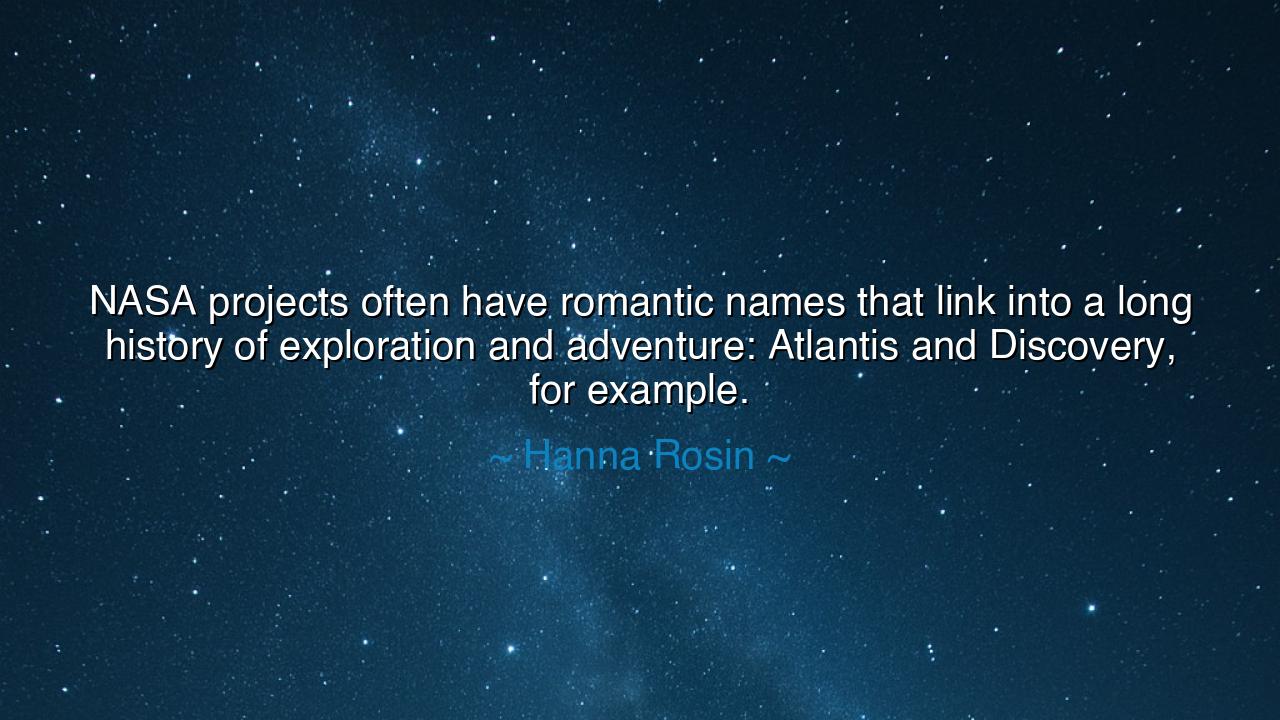
NASA projects often have romantic names that link into a long
NASA projects often have romantic names that link into a long history of exploration and adventure: Atlantis and Discovery, for example.






"NASA projects often have romantic names that link into a long history of exploration and adventure: Atlantis and Discovery, for example." These words by Hanna Rosin offer a profound reflection on the timeless connection between human exploration, adventure, and the deep-rooted romanticism that has always driven us to push beyond the known world. The names given to NASA's space projects, such as Atlantis and Discovery, are not mere labels—they are symbols of humanity’s eternal quest to explore, to discover, and to uncover the mysteries of the universe. These names, like those of the ancient ships that carried explorers to new worlds, carry with them a sense of adventure and heroic endeavor, inviting us to think not only of scientific progress but of the romantic spirit of discovery that has fueled humanity’s greatest achievements throughout the ages.
In the ancient world, exploration and discovery were often seen as the highest expressions of human ambition and courage. The Greeks, who sought to understand not just their immediate surroundings but the entire cosmos, revered the act of exploration. Homer’s Iliad and Odyssey are filled with the romantic tales of heroes who ventured into the unknown, often facing trials, monsters, and gods along the way. Odysseus, the hero of the Odyssey, embarked on a journey to return home, but in doing so, he ventured into realms previously unknown to mortals, battling both external dangers and the inner trials of his spirit. This is the very spirit reflected in the names of Atlantis and Discovery—a courageous pursuit of the unknown, a yearning to chart new realms and stretch the boundaries of human knowledge.
The ancient stories of exploration—such as those of Jason and his Argonauts, whose ship sailed in search of the Golden Fleece—illustrate how the act of discovering was not just about gathering knowledge, but about a profound, romantic pursuit of glory and the unknown. Jason’s journey was one of sacrifice, bravery, and curiosity, much like the space missions that carry such names as Discovery and Atlantis. These names are not chosen randomly but are imbued with the legacy of all those who have ventured into the unknown before. In naming these spacecraft with the names of myth and legend, we honor the spirit of exploration that has long driven the human race—be it by sea or by the stars.
NASA, like the ancient explorers, carries the torch of human curiosity and courage, seeking to conquer the unknown not with weapons, but with knowledge and vision. The names chosen for these missions speak to a deeper truth: humanity has always been driven by a desire to seek out new worlds—not only to expand our understanding but to discover the very limits of our potential. The space shuttle Atlantis is named after the mythic island of Atlantis, symbolizing the lost worlds of legend and the potential for new realms of existence, while Discovery, in its very name, invokes the great adventure of unveiling the unknown. These names are not merely about machines—they represent the continuing journey of humankind to transcend its limits and reach beyond what we can see and understand.
Take, for example, the Renaissance explorers who ventured across the vast, uncharted oceans. Figures like Christopher Columbus, whose voyages ultimately led to the discovery of the Americas, embodied the spirit of romantic exploration. Columbus did not know exactly what lay beyond the horizon, but he was driven by the belief that to explore the unknown was to reach toward something greater—an act that would transform the course of history. The discovery of new lands, like the discovery of space, symbolizes more than the acquisition of new knowledge; it represents the human will to venture, to confront the unknown with courage and a sense of purpose.
In our modern age, the romanticism of exploration is alive in the missions that carry names like Atlantis and Discovery. They echo the deep human desire to reach for something beyond ourselves, to push boundaries, and to seek out the mysteries of the cosmos. These missions are not merely technological feats—they are the continuation of humanity’s ancient quest to understand the universe, to explore the very fabric of existence. As we send spacecraft to distant planets and stars, we carry with us the ancient dreams of the explorers who came before us, who sailed into unknown seas with only the stars to guide them.
The lesson here is profound: exploration—whether by sea, land, or space—is not just about the discovery of new places, but about the transcendence of human limitations. The romantic names we give to our endeavors reflect the truth that, at our core, we are all explorers, driven by the desire to discover, to learn, and to grow. So, to those who follow, embrace the spirit of discovery. Let it guide you in your own journey, for we are all, in a sense, on a quest to explore not just the world around us, but the very depths of our potential. Whether in science, in love, or in life, may you always seek the unknown and venture beyond the horizon, knowing that each step forward is a part of the ancient, noble tradition of human adventure and exploration.






AAdministratorAdministrator
Welcome, honored guests. Please leave a comment, we will respond soon